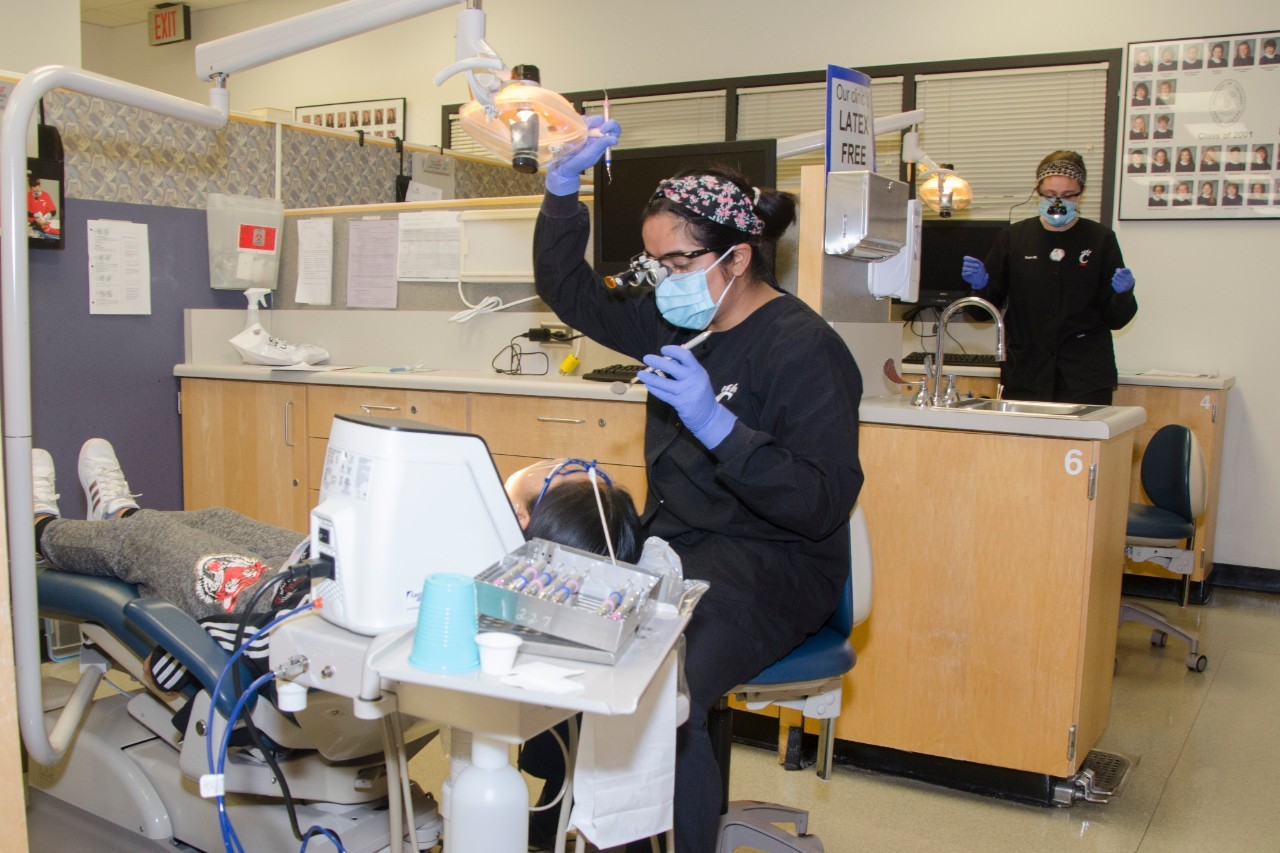
UC study looks to find better ways to treat gum disease
It is estimated that approximately half of the global population over 50 years of age has some type of gum disease, yet little is known about how gum tissue, or gingiva, acts as a barrier for effective drug delivery in local therapies, say researchers at the University of Cincinnati (UC) James L. Winkle College of Pharmacy.
“Basically, there’s no information on how permeable the tissue is or how drug formulations affect the tissue to effectively deliver the drug for local treatment,” says Kevin Li, PhD. Li is the principal investigator of a $481,000 grant from the National Institutes of Health (#1R15DEO28701) to both study gum tissue and work toward developing an in-home treatment for gum diseases. His study is titled: “Characterization of Gingival Drug Delivery to Improve Local Treatment.”

Kevin Li, PhD, researcher at the UC College of Pharmacy, in his lab on the UC medical campus.
The oral cavity, says Li, a professor in the Winkle College of Pharmacy’s Division of Pharmaceutical Sciences, is made up of both hard and soft tissues. Some soft tissues, such as the gingiva, are keratinized tissues with relatively resistive cell layers to provide protection from the mechanical impacts of chewing food. Other soft tissues, such as buccal mucosa (tissue covering the inside of the cheek and underneath the tongue), are non-keratinized. While the properties of buccal mucosa have been investigated for drug absorption, the barrier of gingiva has not been systematically studied.
Healthy gums fit tightly around teeth roots like a collar. They turn slightly inward where they meet teeth, forming a narrow groove. Gingivitis is a common and mild form of gum disease that causes irritation, redness and swelling of the gums, affecting the part of the gum around the root of teeth; and gingivitis can lead to much more serious gum disease called periodontitis.
Periodontitis can cause tooth loss and complications such as bone infections, and facial cellulitis. People who suffer from periodontitis receive treatments such as scaling and root planing, an invasive procedure in a dentist office. Currently, there is no convenient in-home treatment other than tooth brushing and mouthwash. Drug absorption from topical delivery, such as mouthwash, is not very effective due to the short treatment duration and tissue barrier, says Li.
“Local drug delivery for periodontal disease is difficult and not a well-established area of study,” he says, explaining that the first goal of his study is to characterize the barrier of gingiva for effective drug delivery. The second goal is to develop a convenient and effective in-home treatment.
Coinvestigators are Gary Kelm, PhD, an adjunct professor in the Winkle College of Pharmacy, and Jerome McMahon, DDS, an assistant professor of surgery in the UC College of Medicine and director of the Dental Center at UC Health, the university’s affiliated health system. Deepak Krishnan, DDS, associate professor of surgery and chief of the College of Medicine’s Division of Oral and Maxillofacial Surgery, will also assist in the project. Undergraduate and graduate students will be involved in the project under the direction of Li and coinvestigators.
Li has more than 20 years of experience in drug delivery research including the mechanistic studies of tissue barriers, drug transport modeling and development of physical and chemical techniques to enhance drug delivery for the skin, eye, nail, inner ear and oral cavity. He has more than 100 publications in these research areas. His research has been funded by NIH, Food and Drug Administration and pharmaceutical and cosmetic industries.
The University of Cincinnati is classified as a Research University (Very High Research Activity) by the Carnegie Commission, and is ranked at No. 37 among U.S. public research universities by the National Science Foundation, as UC and its affiliates earned just over $424 million in FY2018 research funding.Replace with your text
Related Stories
Before the medals: The science behind training for freezing mountain air
February 19, 2026
From freezing temperatures to thin mountain air, University of Cincinnati exercise physiologist Christopher Kotarsky, PhD, explained how cold and altitude impact Olympic performance in a recent WLWT-TV/Ch. 5 news report.
Discovery Amplified expands research, teaching support across A&S
February 19, 2026
The College of Arts & Sciences is investing in a bold new vision for research, teaching and creative activity through Discovery Amplified. This initiative was launched through the Dean’s Office in August 2024, and is expanding its role as a central hub for scholarly activity and research support within the Arts & Sciences (A&S) community. Designed to serve faculty, students, and staff, the initiative aims to strengthen research productivity, foster collaboration, and enhance teaching innovation. Discovery Amplified was created to help scholars define and pursue academic goals while increasing the reach and impact of A&S research and training programs locally and globally. The unit provides tailored guidance, connects collaborators, and supports strategic partnerships that promote innovation across disciplines.
Blood Cancer Healing Center realizes vision of comprehensive care
February 19, 2026
With the opening of research laboratories and the UC Osher Wellness Suite and Learning Kitchen, the University of Cincinnati Cancer Center’s Blood Cancer Healing Center has brought its full mission to life as a comprehensive blood cancer hub.
